Charles E W Bean, Diaries, AWM38 3DRL 606/244/1 - 1916 - 1933 - Part 3
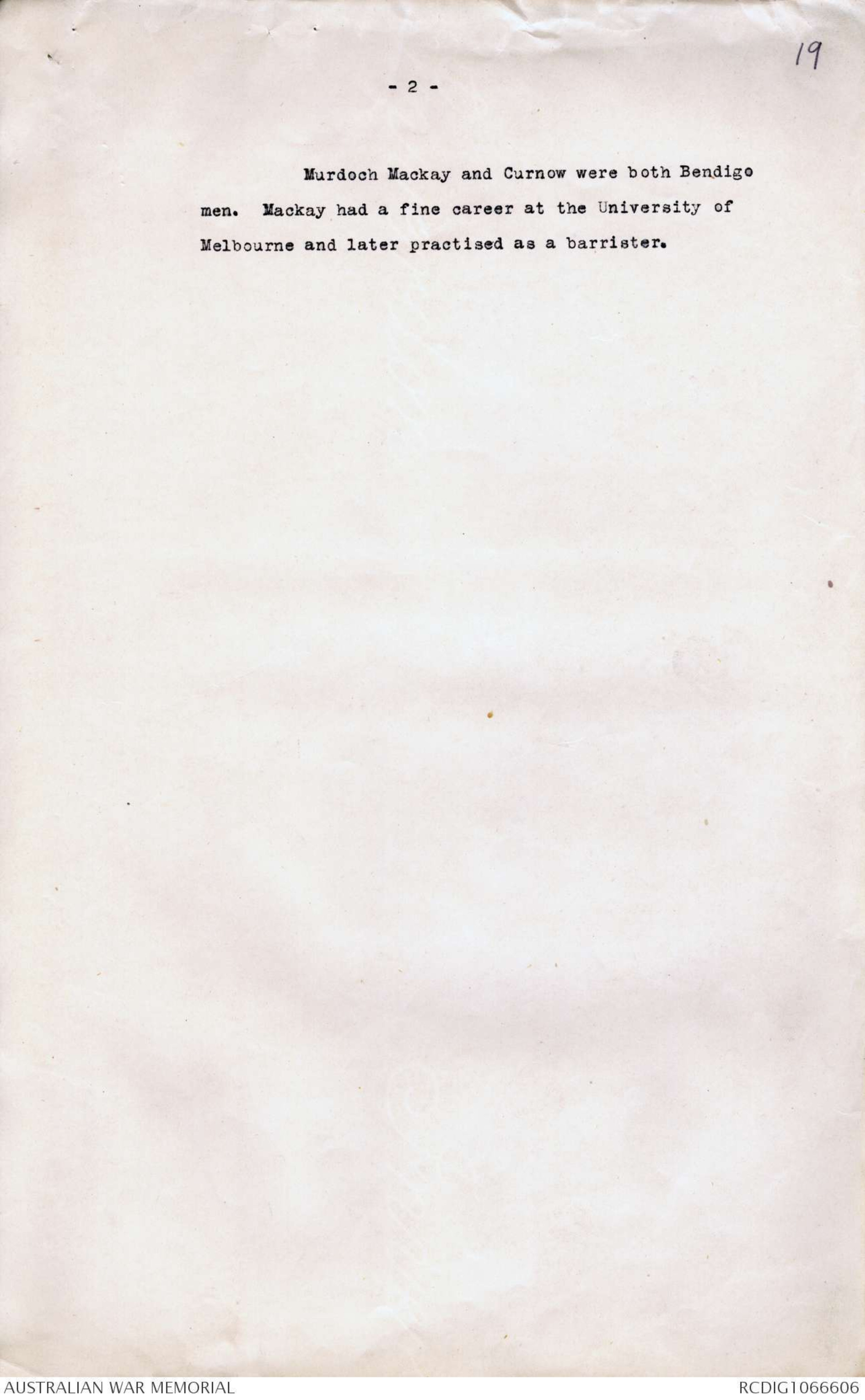
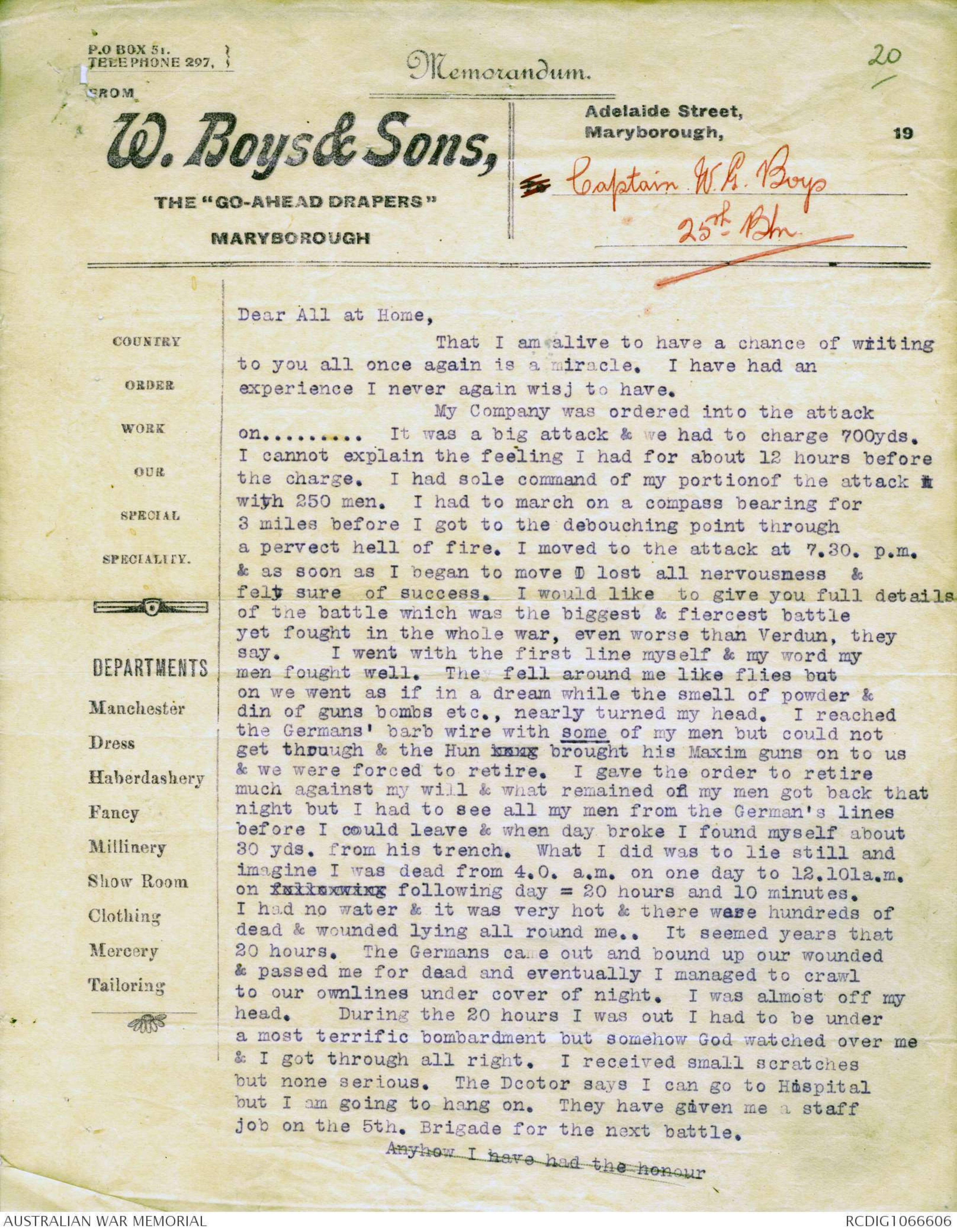
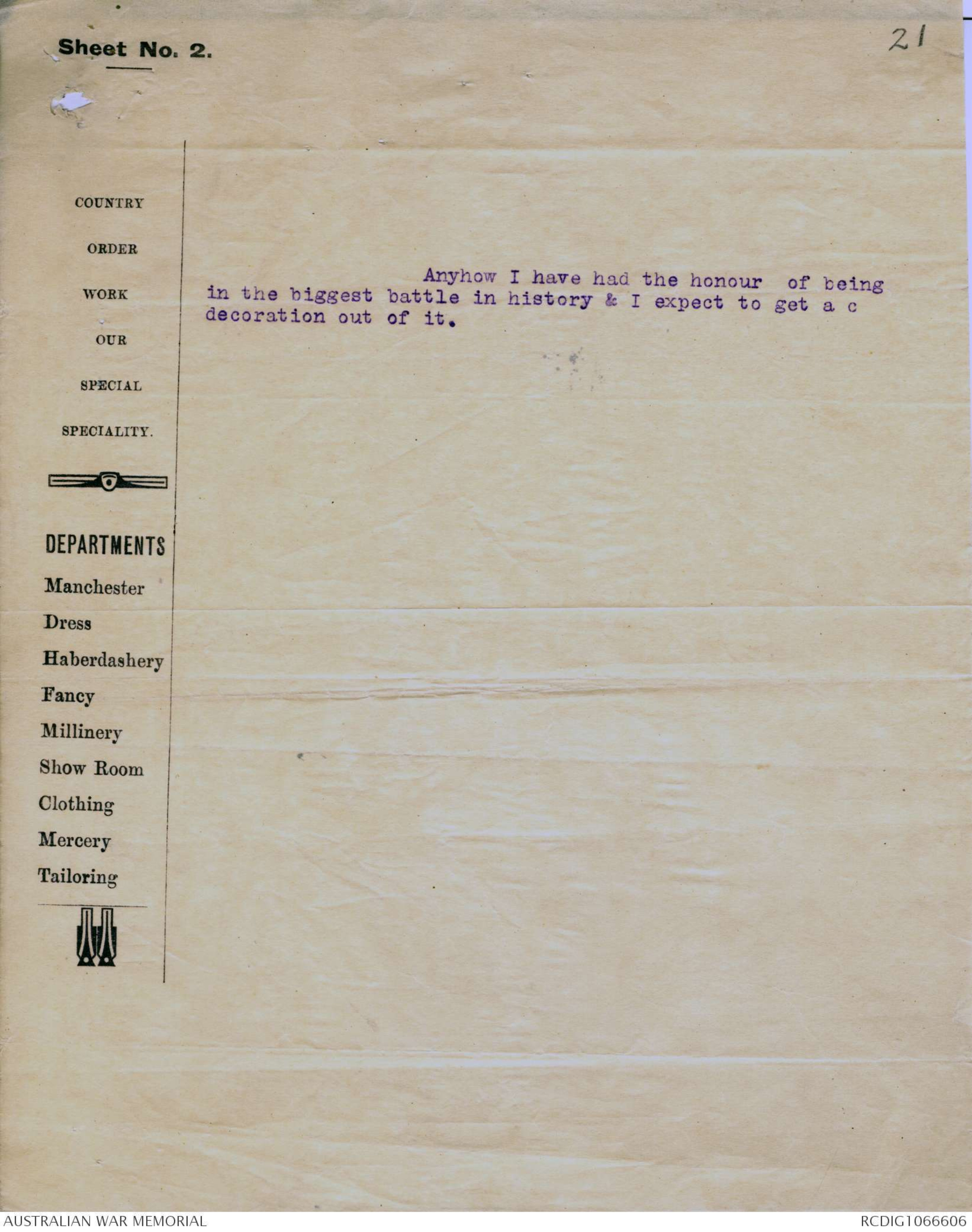
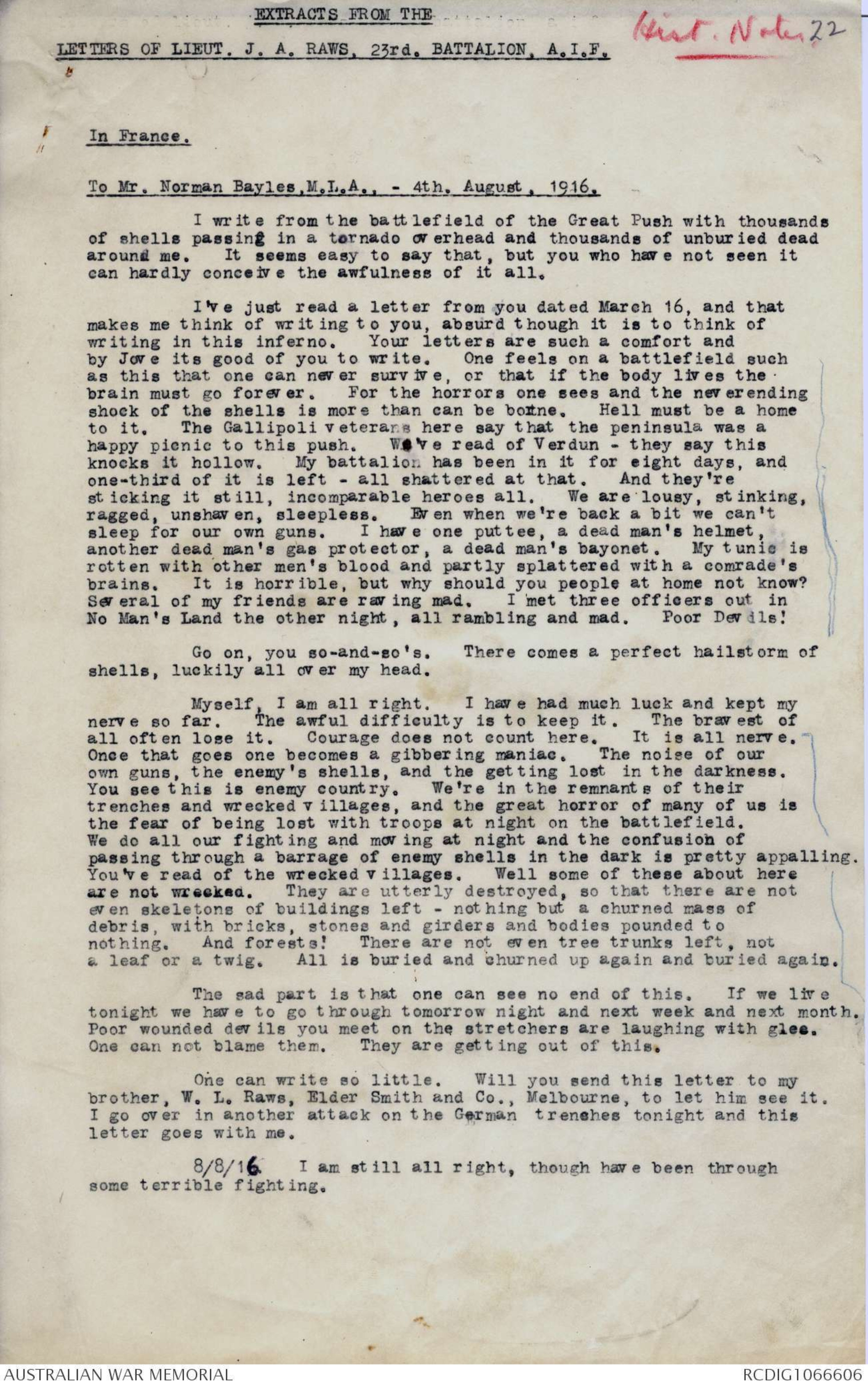
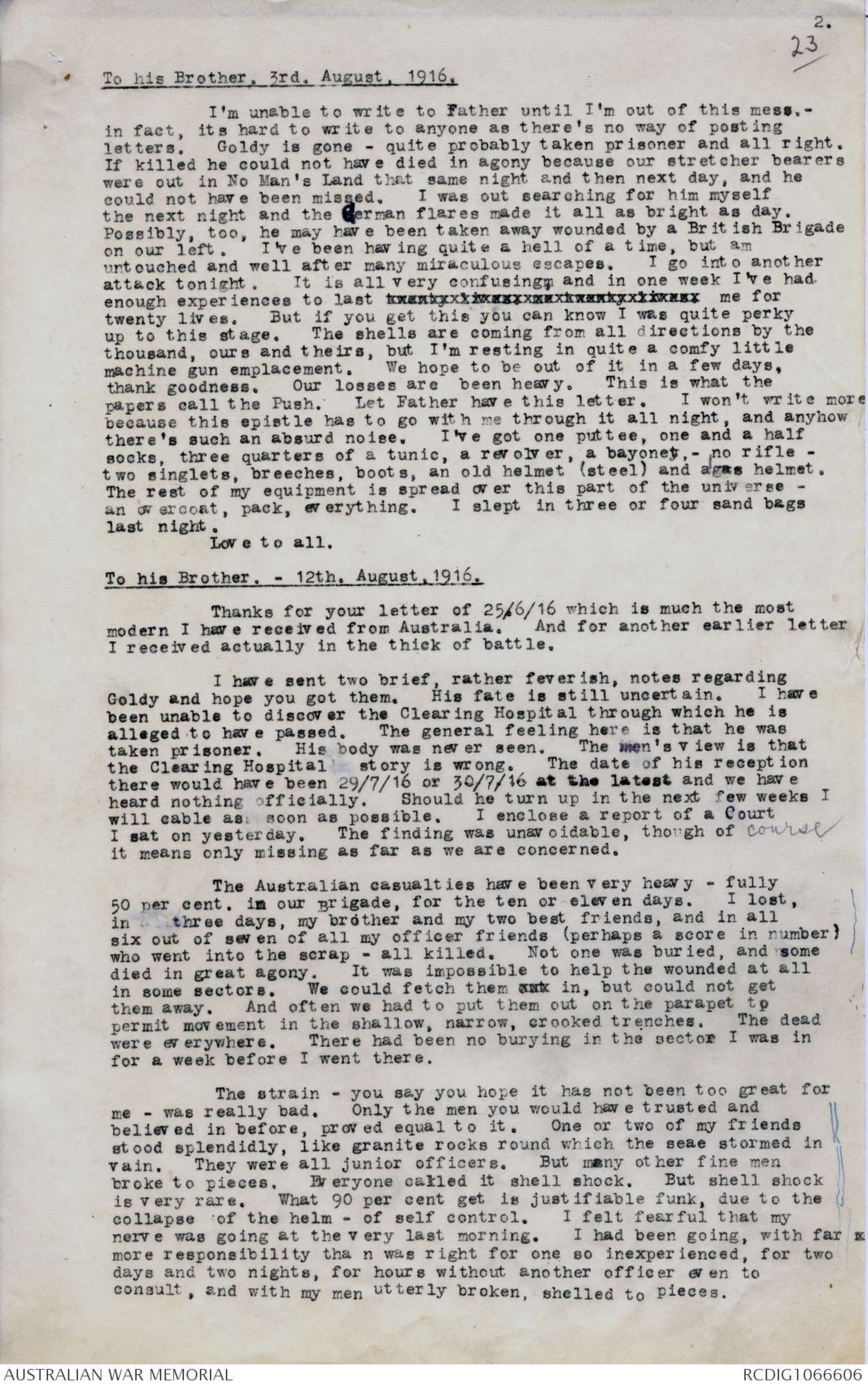
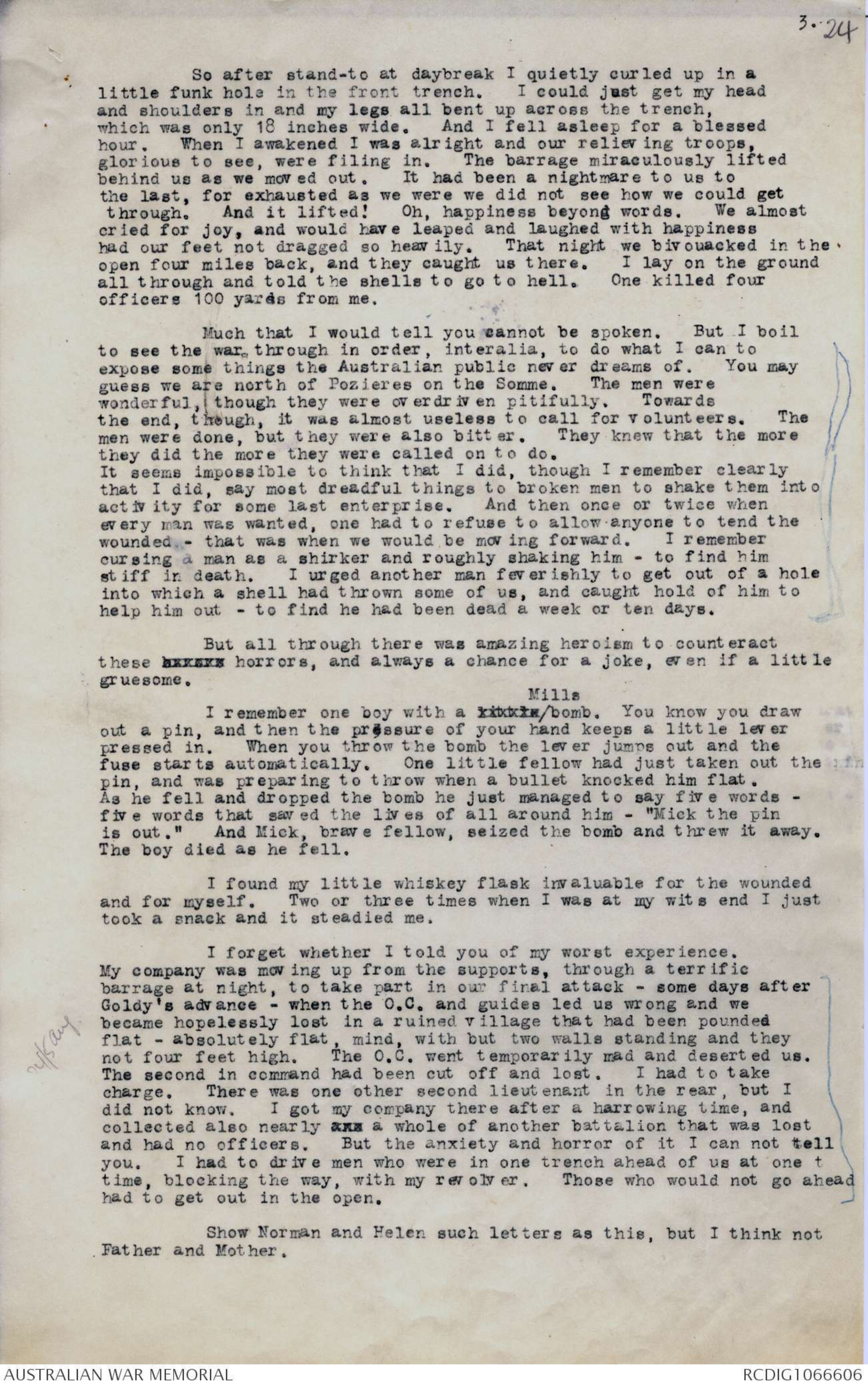
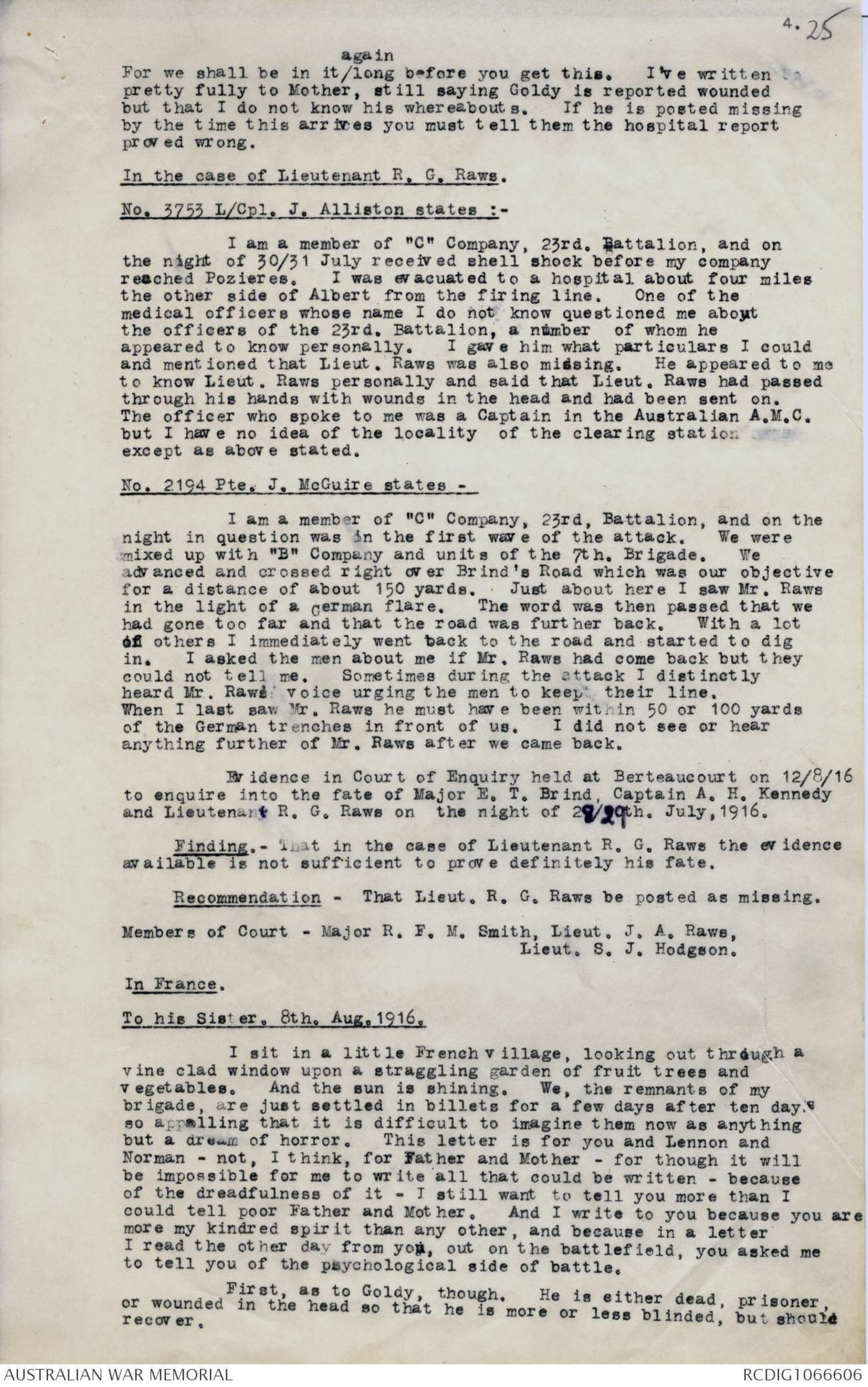
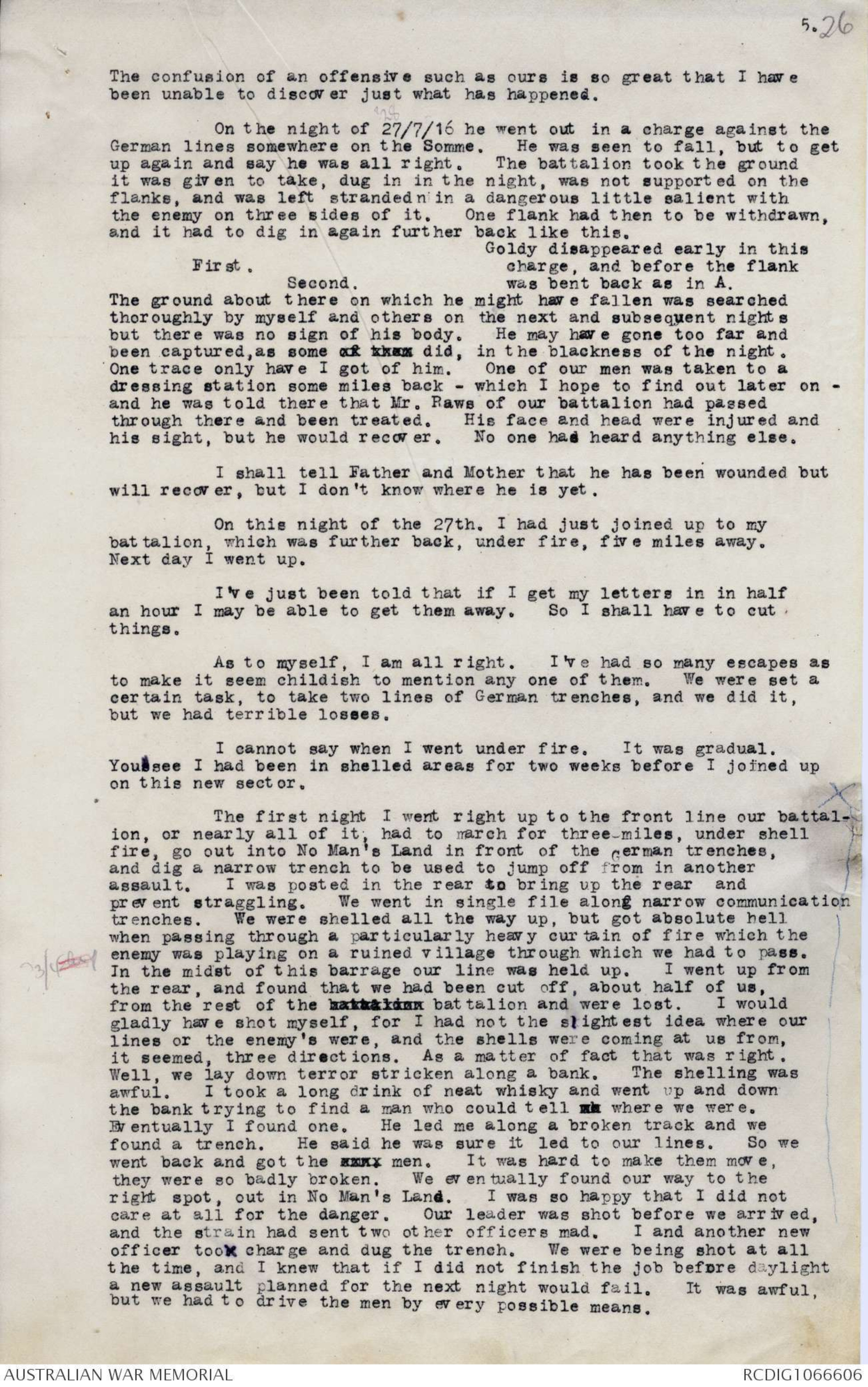
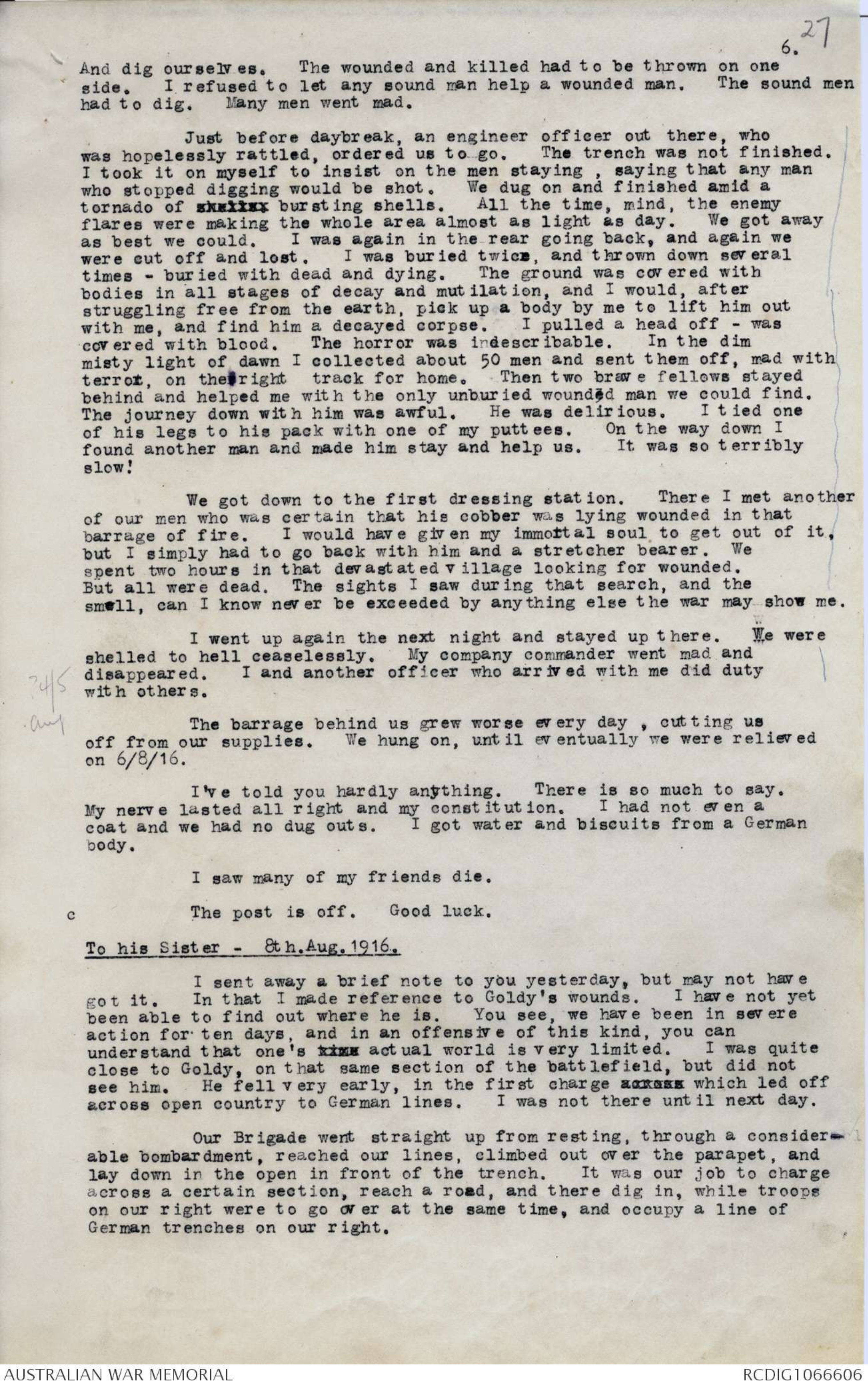
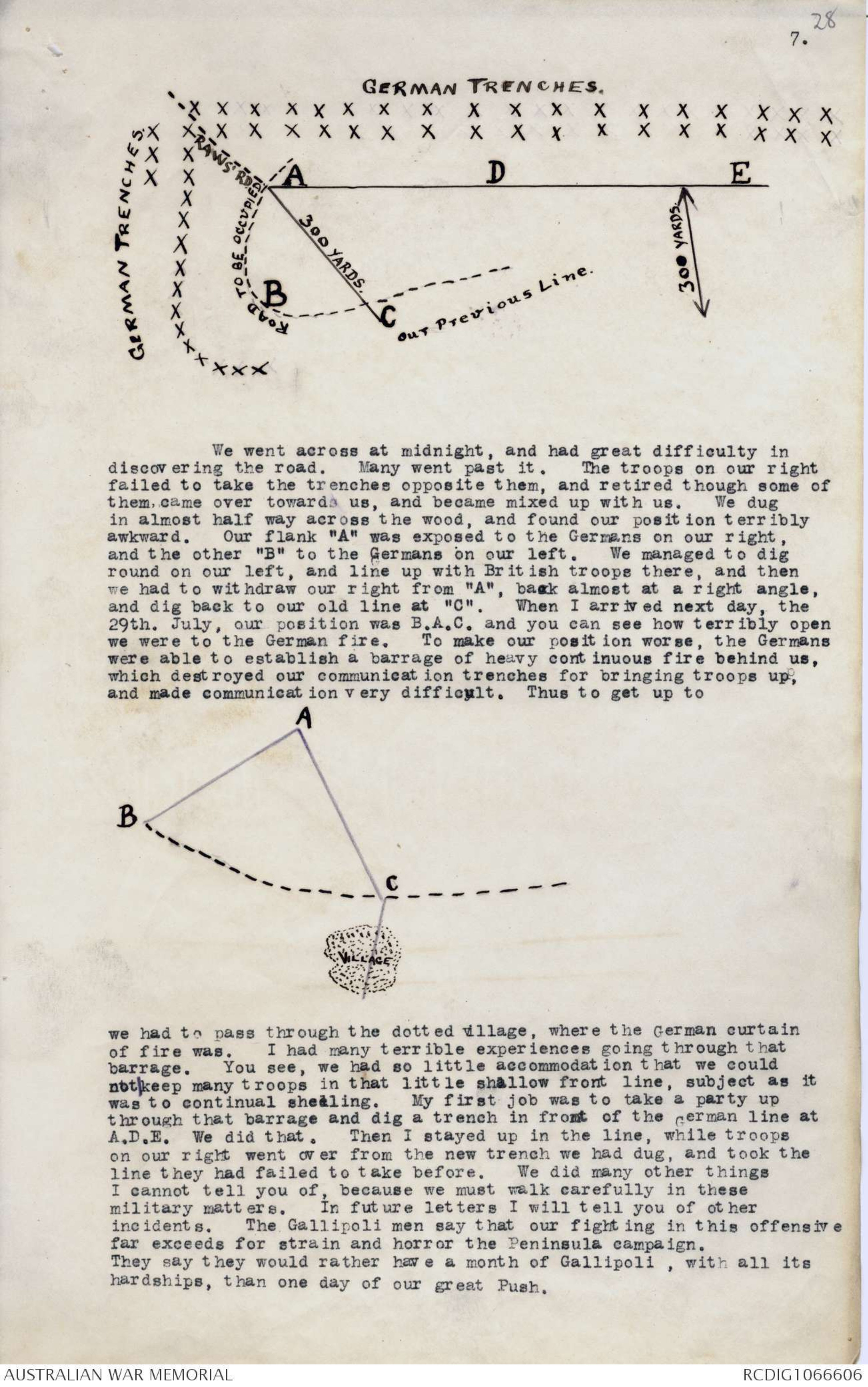
[*19*]
- 2 -
Murdoch Mackay and Curnow were both Bendigo
men. Mackay had a fine career at the University of
Melbourne and later practised as a barrister.
[*20*]
P.O. BOX 5,)
TELEPHONE 207, )
Memorandum.
FROM
W. Boys & Sons,
The "GO-AHEAD DRAPERS"
MARYBOROUGH
Adelaide Street,
Maryborough, 19To Captain W G Boys
25th Btn
[* COUNTRY ORDER WORK OUR SPECIAL SPECIALITY. DEPARTMENTS Manchester Dress Haberdashery Fancy Millinery Show Room Clothing Mercery Tailoring*]
Dear All at Home,
That I am alive to have a chance of wiriting
to you all once again is a miracle. I have had an
experience I never again wisj to have.
My Company was ordered into the attack
on....... It was a big attack & we had to charge 700yds.
I cannot explain the feeling I had for about 12 hours before
the charge. I had sole command of my portionof the attack w
wiyth 250 men. I had to march on a compass bearing for
3 miles before I got to the debouching point through
a pervect hell of fire. I moved to the attack at 7.30. p.m.
& as soon as I began to move OI lost all nervousness &
felt sure of success. I would like to give you full details
of the battle which was the biggest & fiercest battle
yet fought in the whole war, even worse than Verdun, they
say. I went with the first line myself & my word my
men fought well. they fell around me like flies but
on we went as if in a dream while the smell of powder &
din of guns bombs etc., nearly turned my head. I reached
the Germans' barb wire with some of my men but could not
get through & the Hun boug brought his Maxim guns on to us
& we were forced to retire. I gave the order to retire
much against my will & what remained of my men got back that
night but I had to see all my men from the German's lines
before I could leave & when day broke I found myself about
30 yds. from his trench. What I did was to lie still and
imagine I was dead from 4.0. a.m. on one day to 12.101a.m.
on fallowing following day = 20 hours and 10 minutes.
I had no water & it was very hot & there were hundreds of
dead & wounded lying all round me.. It seemed years that
20 hours. The Germans came out and bound up our wounded
& passed me for dead and eventually I managed to crawl
to our ownlines under cover of night. I was almost off my
head. During the 20 hours I was out I had to be under
a most terrific bombardment but somehow God watched over me
& I got through all right. I received small scratches
but none serious. The Doctor says I can go to Hospital
but I am going to hang on. They have given me a staff
job on the 5th. Brigade for the next battle.Anyhow I have had the honour
Sheet No. 2. 21
Anyhow I have had the honour of being
in the biggest battle in history & I expect to get a c
decoration out of it.
[*COUNTRY ORDER WORK OUR SPECIAL SPECIALITY. DEPARTMENTS Manchester Dress Haberdashery Fancy Millinery Show Room Clothing Mercery Tailoring*]
[*Hist. Notes 22*]
EXTRACTS FROM THE
LETTERS OF LIEUT. J. A. RAWS, 23rd BATTALION, A.I.F.
In France.
To Mr. Normal Bayles, M.L.A., - 4th August, 1916.
I write from the battlefield of the Great Push with thousands
of shells passing in a tornado overhead and thousands of unburied dead
around me. It seems easy to say that, but you who have not seen it
can hardly conceive the awfulness of it all.
I've just read a letter from you dated March 16, and that
makes me think of writing to you, absurd though it is to think of
writing in this inferno. Your letters are such a comfort and
by Jove its good of you to write. One feels on a battlefield such
as this that one can never survive, or that if the body lives the
brain must go forever. For the horrors ones sees and the never ending
shock of the shells is more than can be borne. Hell must be a home
to it. The Gallipoli veterans here say that the peninsula was a
happy picnic to this push. We've read of Verdun - they say this
knocks it hollow. My battalion has been in it for eight days, and
one-third of it is left - all shattered at that. And they're
sticking it still, incomparable heroes all. We are lousy, stinking,
ragged, unshaven, sleepless. Even when we're back a bit we can't
sleep for our own guns. I have one puttee, a dead man's helmet,
another dead man's gas protector, a dead man's bayonet. My tunic is
rotten with other men's blood and partly splattered with a comrade's
brains. It is horrible, but why should you people at home not know?
Several of my friends are raving mad. I met three officers out in
No Man's Land the other night, all rambling and mad. Poor Devils!
Go on, you so-and-so's. There comes a perfect hailstorm of
shells, luckily all over my head.
Myself, I am all right. I have had much luck and kept my
nerve so far. The awful difficulty is to keep it. The bravest of
all often lose it. Courage does not count here. It is all nerve.
Once that goes one becomes a gibbering maniac. The noise of our
own guns, the enemy's shells, and the getting lost in the darkness.
You see this is enemy country. We're in the remnants of their
trenches and wrecked villages, and the great horror of many of us is
the fear of being lost with troops at night on the battlefield.
We do all our fighting and moving at night and the confusion of
passing through a barrage of enemy shells in the dark is pretty appalling.
You've read of the wrecked villages. Well some of these about here
are not wrecked. They are utterly destroyed, so that there are not
even skeletons of buildings left - nothing but a churned mass of
debris, with bricks, stones and girders and bodies pounded to
nothing. And forests! There are not even tree trunks left, not
a leaf or a twig. All is buried and churned up again and buried again.
The sad part is that one can seen no end of this. If we live
tonight we have to go through tomorrow night and next week and next month.
Poor wounded devils you meet on the stretchers are laughing with glee.
One can not blame them. They are getting out of this.
One can write so little. Will you send this letter to my
brother, W.L. Raws, Elder Smith and Co., Melbourne, to let him see it.
I go over in another attack on the German trenches tonight and this
letter goes with me.
8/8/16 I am still all right, though have been through
some terrible fighting.
2.
[*23*]
To his Brother, 3rd, August, 1916.
I'm unable to write to Father until I'm out of this mess.-
in fact, it's hard to write to anyone as there's no way of posting
letters. Goldy is gone - quite probably taken prisoner and all right.
If killed he could not have died in agony because our stretcher bearers
were out in No Man's Land that same night and then next day, and he
could not have been missed. I was out searching for him myself
the next night and the German flares made it all as bright as day.
Possibly, too, he may have been taken away wounded by a British Brigade
on our left. I've been having quite a hell of a time, but am
untouched and well after many miraculous escapes. I go into another
attack tonight. It is all very confusingm, and in one week I've had
enough experiences to last twentyxxxxxxxxxxxxxxxxtwenty lives me for
twenty lives. But if you get this you can know I was quite perky
up to this stage. The shells are coming from all directions by the
thousand, ours and theirs, but I'm resting in quite a comfy little
machine gun emplacement. We hope to be out of it in a few days,
thank goodness. Our losses are been heavy. this is what the
papers call the Push. let Father have this letter. I won't write more
because this epistle has to go with me through it all night, and anyhow
there's such an absurb noise. I've got one puttee, one and a half
socks, three quarters of a tunic, a revolver, a bayonet, - no rifle -
two singlets, breeches, boots, an old helmet (steel) and agas helmet.
The rest of my equipment is spread over this part of the universe -
an overcoat, pack, everything. I slept in three or four sand bags
last night.
Love to all.
To his Brother. - 12th, August, 1916.
Thanks for your letter of 25/6/16 which is much the most
modern I have received from Australia. And for another earlier letter
I received actually in the thick of battle.
I have sent two brief, rather feverish, notes regarding
Goldy and hope you got them. His fate is still uncertain. I have
been unable to discover the Clearing Hospital through which he is
alleged to have passed. The general feeling here is that he was
taken prisoner. His body was never seen. The men's view is that
the Clearing Hospital story is wrong. The date of his reception
there would have been 29/7/16 or 30/7/16 at the latest and we have
heard nothing officially. Should he turn up in the next few weeks I
will cable as soon as possible. I enclose a report of a Court
I sat on yesterday. The finding was unavoidable, though of course
it means only missing as far as we are concerned.
The Australian casualties have been very heavy - fully
50 per cent, in our Brigade, for the ten or eleven days. I lost
in three days, my brother and my two best friends, and in all
six out seven of all of my officer friends (perhaps a score in number)
who went into the scrap - all killed. Not one was buried, and some
died in great agony. It was impossible to help the wounded at all
in some sectors. We could fetch them out in, but could not get
them away. And often we had to put them out on the parapet to
permit movement in the shallow, narrow crooked trenches. The dead
were everywhere. There had been no burying in the sector I was in
for a week before I went there.
The strain - you say you hope it has not been too great for
me - was really bad. Only the men you would have trusted and
believed in before, proved equal to it. One or two of my friends
stood splendidly, like granite rocks round which the seae stormed in
vain. They were all junior officers. But many other fine men
broke to pieces. Everyone called it shell shock. But shell shock
is very rare. What 90 per cent get is justifiable funk, due to the
collapse of the helm - of self control. I felt fearful that my
nerve was going at the very last morning. I had been going, with far x
more responsibility tha n was right for one so inexperienced, for two
days and two nights, for hours without another officer even to
consult, and with my men utterly broken, shelled to pieces.
3.
[*24*]
So after stand-to at daybreak I quietly caurled up in a
little funk hole in the front trench. I could just get my head
and shoulders in and my legs all bent up across the trench,
which was only 18 inches wide. And I fell asleep for a blessed
hour. When I awakened I was alright and our relieving troops,
glorious to see, were filing in. The barrage miraculously lifted
behind us as we moved out. It had been a nightmare to us to
the last, for exhausted as we were we did not see how we could get
through. And it lifted! Oh happiness beyond words. We almost
cried for joy, and would have leaped and laughed with happiness
had our feed not dragged so heavily. That night we bivouacked in the
open four miles back, and they caught us there. I lay on the ground
all through and told the shells to go to hell. One killed four
officers 100 yards from me.
Much that I would tell you cannot be spoken. But I boil
to see the war through in order, interalia, to do what I can to
expose some things the Australian public never dreams of. You may
guess we are north of Pozieres on the Somme. The men were
wonderful, though they were overdriven pitifully. Towards
the end, though, it was almost useless to call for volunteers. The
men were done, but they were also bitter. They knew that the more
they did the more they were called on to do.
It seems impossible to think that I did, though I remember clearly
that I did, say most dreadful things to broken men to shake them into
activity for some last enterprise. And then once or twice when
every man was wanted, one had to refuse to allow anyone to tend the
wounded - that was when we would be moving forward. I remember
cursing a man as a shirker and roughly shaking him - to find him
stiff in death. I urged another man feverishly to get out of a hole
into which a shell had thrown some of us, and caught hold of him to
help him out - to find he had been dead a week or ten days.
But all through there was amazing heroism to counteract
these horors horrors, and always a chance for a joke, even if a little
gruesome.
I remember one boy with a little^Mills bomb. You know you draw
out a pin, and then the pressure of your hand keeps a little lever
pressed in. When you throw the bomb the lever jumps out and the
fuse starts automatically. One little fellow had just taken out the
pin, and was preparing to throw when a bullet knocked him flat.
As he fell and dropped the bomb he just managed to say five words -
five words that saved the lives of all around him - "mick the pin
is out." And Mick, brace fellow, seized the bomb and threw it away.
The boy died as he fell.
I found my little whiskey flask invaluable for the wounded
and for myself. Two or three times when I was at my wits end I just
took a snack and it steadied me.
I forget whether I told you of my worst experience.
My company was moving up from the supports, through a terrific
barrage at night, to take part in our final attack - some days after
Goldy's advance - when the O.C. and guides led us wrong and we
[*?4/5 Aug*] became hopelessly lost in a ruined village that had been pounded
flat - absolutely flat, mind, with but two walls standing and they
not four feet high. The O.C. went temporarily mad and deserted us.
The second in command had been cut off and lost. I had to take
charge. There was one other second lieutenant in the rear, but I
did not know. I got my company there after a harrowing time, and
collected also nearly xxx a whole of another battalion that was lost
and had no officers. But the anxiety and horror of it I can not tell
you. I had to drive men who were in one trench ahead of us at one t
time, blocking the way, with my revolver. Those who would not go ahead
had to get out in the open.
Show Norman and Helen such letters as this, but I think not
Father and Mother.
4.
[*25*]
For we shall be in it ^again long before you get this. I've written
pretty fully to Mother, still saying Goldy is reported wounded
but that I do not know his whereabouts. If he is posted missing
by the time this arrives you must tell them the hospital report
proved wrong.
In the case of Lieutenant R. G. Raws.
No. 3753 L/Cpl. J. Alliston states:-
I am a member of "C" Company, 23rd. Battalion, and on
the night of 30/31 July received shell shock before my company
reached Pozieres. I was evacuated to a hospital about four miles
to other side of Albert from the firing line. One of the
medical officers whose name I do not know questioned me about
the officers of the 23rd. Battalion, a number of whom he
appeared to know personally. I gave him what particulars I could
and mentioned that Lieut. Raws was also missing. He appeared to me
to know Lieut. Raws personally and said that Lieut. Raws had passed
through his hands with wounds in the head and had been sent on.
The officer who spoke to me was a Captain in the Australian A.M.C.
but I have no idea of the locality of the clearing station
except as above stated.
No.2194 Pte. J. McGuire states-
I am a member of "C" Company, 23rd, Battalion, and one the
night in question was in the first wave of the attack. We were
mixed up with "B" Company and units of the 7th Brigade. We
advanced and crossed right over Brind's Road which was our objective
for a distance of about 150 yards. Just about here I saw Mr. Raws
in the light of a German flare. The word was then passed that we
had gone too far and that the road was further back. With a lot
of others I immediately went back to the road and started to dig
in. I asked the men about me if Mr. Raws had come back but they
could not tell me. Sometimes during the attack I distinctly
heard Mr. Raws voice urging the men to keep their line.
When I last saw Mr. Raws he must have been within 50 or 100 yards
of the German trenches in front of us. I did not see or hear
anything further of Mr. Raws after we came back.
Evidence in Court of Enquiry held at Berteaucourt on 12/8/16
to enquire into the fate of Major E. T. Brind, Captain, A. H. Kennedy
and Lieutenant R. G. Raws on the night of 28/29th. July, 1916.
Finding. - That in the case of Lieutenant R. G. Raws the evidence
available is not sufficient to prove definitely his fate.
Recommendation - That Lieut. R. G. Raws be posted as missing.
Members of Court - Major R. F. M. Smith, Lieut. J. A. Raws,
Lieut. S. J. Hodgson.
In France.
To his Sister, 8th. Aug. 1916.
I sit in a little French village, looking out through a
vine clad window upon a straggling garden of fruit trees and
vegetables. And the sun is shining. We, the remnants of my
brigade, are just settled in billet for a few days after ten days,
so appalling that it is difficult to imagine them now as anything
but a dream of horror. This letter is for you and Lennon and
Norman- not, I think, for Father and Mother - for though it will
be impossible for me to write all that could be written - because
of the dreadfulness of it - I still want to tell you more than I
could tell poor Father and Mother. And I write to you because you are
more my kindred spirit than any other, and because in a letter
I read the other day from you, out on the battlefield, you asked me
to tell you of the psychological side of battle.
First, as to Goldy, though. He is either dead, prisoner,
or wounded in the head so that he is more or less blinded, but should
recover.
5.
[*26*]
The confusion of an offensive such as ours is so great that I have
been unable to discover just what has happened.
On the night of 27^?28/7/16 he went out in a charge against the
German lines somewhere on the Somme. He was seen to fall, but to get
up again and say he was all right. The battalion took the ground
it was given to take, dug in in the night, was not supported on the
flanks, and was left stranded n in a dangerous little salient with
the enemy on three sides of it. One flank had then to be withdrawn,
and it had to dig in again further back like this.
Goldy disappeared early in this
First. charge, and before the flank
Second. was bent back as in A.
The ground about there on which he might have fallen was searched
thoroughly by myself and others on the next and subsequent nights
but there was no sign of his body. He may have gone too far and
been captured as some of them did, in the blackness of the night.
One trace only have I got of him. One of our men was taken to a
dressing station some miles back - which I hope to find out later on
and he was told there that Mr. Raws of our battalion had passed
through there and been treated. His face and head were injured and
his sight, but he would recover. No one had heard anything else.
I shall tell Father and Mother than he has been wounded but
will recover, but I don't know where he is yet.
On this night of the 27th. I had just joined up to my
battalion, which was further back, under fire, five miles away.
Next day I went up.
I've just been told that if I get my letters in in half
an hour I may be able to get them away. So I shall have to cut
things.
As to myself, I am all right. I've had so many escapes as
to make it seem childish to mention any one of them. We were set a
certain task, to take two lines of German trenches, and we did it,
but we had terrible loses.
I cannot say when I went under fire. It was gradual.
Youx see I had been in shelled areas for two weeks before I joined up
on this new sector.
The first night I went right up to the front line our battalion,
or nearly all of it, had to march for three miles, under shell
fire, go out into No Man's Land in front of the German trenches,
and dig a narrow trench to be used to jump off from in another
assault. I was posted in the rear to bring up the rear and
prevent straggling. We went in single file along narrow communication
trenches. We were shelled all the way up, but got absolute hell
when passing through a particularly heavy curtain of fire which the
[*?3/4 Aug] enemy was playing on a ruined village through which we had to pass.
In the midst of this barrage our line was held up. I went up from
the rear, and found that we had been cut off, about half of us,
from the rest of the battalion battalion and were lost. I would
gladly have shot myself, for I had not the slightest idea where our
lines or the enemy's were, and the shells were coming at us from,
it seemed, three directions. As a matter of fact that was right.
Well, we lay down terror stricken along a bank. The shelling was
awful. I took a long drink of neat whisky and went up and down
the bank trying to find a man who could tell xx where we were.
Eventually I found one. He led me along a broken track and we
found a trench. He said he was sure it led to our lines. So we
went back and got the xxxx men. It was hard to make them move,
they were so badly broken. We eventually found our way to the
right spot, out in No Man's Land. I was so happy that I did not
care at all for the danger. Our leader was shot before we arrived
and the strain had sent two other officers mad. I and another new
officer took charge and dug the trench. We were being shot at all
the time, and I knew that if I did not finish the job before daylight
a new assault planned for the next night would fail. It was awful,
but we had to drive the men by every possible means.
[*27*]
6.
And dig ourselves. The wounded and killed had to be thrown on one
side. I refused to let any sound man help a wounded man. The sound men
had to dig. Many men went mad.
Just before daybreak, an engineer officer out there, who
was hopelessly rattled, ordered us to go. The trench was not finished.
I took it on myself to insist on the men staying, saying that any man
who stopped digging would be shot. We dug on and finished amid a
tornado of shells, bursting shells. All the time, mind, the enemy
flares were making the whole area almost as light as day. We got away
as best we could. I was again in the rear going back, and again we
were cut off and lost. I was buried twice, and thrown down several
times - buried with dead and dying. The ground was covered with
bodies in all stages of decay and mutilation, and I would, after
struggling free from the earth, pick up a body by me to lift him out
with me, and find him a decayed corpse. I pulled a head off - was
covered with blood. The horror was indescribable. In the dim
mistly light of dawn I collected about 50 men and sent them off, mad with
terror, on the right track for home. Then two brave fellows stayed
behind and helped me with the only unburied wounded man we could find.
The journey down with him was awful. He was delirious. I tied one
of his legs to his pack with one of my puttees. On the way down
I found another man and made him stay and help us. It was so terribly
slow!
We got down to the first dressing station. There I met another
of our men who was certain that his cobber was lying wounded in that
barrage of fire. I would have given my immortal soul to get out of it,
but I simply had to go back with him and a stretcher bearer. We
spent two hours in that devastated village looking for wounded.
But all were dead. The sights I saw during that search, and the
smell, can I know never be exceeded by anything else the war may show me.
I went up again the next night and stayed up there. We were
shelled to hell ceaselessly. My company commander went mad and
[*?4/5 Aug*] disappeared. I and another officer who arrived with me did duty
with others.
The barrage behind us grew worse every day, cutting us
off from our supplies. We hung on, until eventually we were relieved
on 6/8/16.
I've told you hardly anything. There is so much to say.
My nerve lasted all right and my constitution. I had not even a
coat and we had no dug outs. I got water and biscuits from a German
body.
I saw many of my friends die.
c The post is off. Good luck.
To his Sister - 8th. Aug. 1916.
I sent away a brief note to you yesterday, but may not have
got it. In that I made reference to Goldy's wounds. I have not yet
been able to find out where he is. You see, we have been in severe
action for ten days, and in an offensive of this kind, you can
understand that one's time actual world is very limited. I was quite
close to Goldy, on that same section of the battlefield, but did not
see him. He fell very early, in the first charge across which led off
across open country to German lines. I was not there until next day.
Our Brigade went straight up from resting, through a considerable
bombardment, reached our lines, climbed out over the parapet, and
lay down in the open in front of the trench. It was our job to charge
across a certain section, reach a road, and there dig in, while troops
on our right were to go over at the same time, and occupy a line of
German trenches on our right.
[*28*]
7.
Diagram - see original document
We went across at midnight, and had great difficulty in
discovering the road. Many went past it. The troops on our right
failed to take the trenches opposite them, and retired though some of
them came over towards us, and became mixed up with us. We dug
in almost half way across the wood, and found our position terribly
awkward. Our flank "A" was exposed to the Germans on our right
and the other "B" to the Germans on our left. We managed to dig
round on our left, and line up with British troops there, and then
we had to withdraw our right from "A", back almost at a right angle,
and dig back to our old line at "C". When I arrived next day, the
29th. July, our position was B.A.C. and you can see how terribly open
we were to the German fire. To make our position worse, the Germans
were able to establish a barrage of heavy continuous fire behind us,
which destroyed our communication trenches for bringing troops up,
and made communication very difficult. Thus to get up to
Diagram - see original document
we had to pass through the dotted village, where the German curtain
of fire was. I had many terrible experiences going through that
barrage. You see, we had so little accommodation that we could
not keep many troops in that little shallow front line, subject as it
was to continual shelling. My first job was to take a party up
through that barrage and dig a trench in front of the German line at
A.D.E. We did that. Then I stayed up in the line, while troops
on our right went over from the new trench we had dug, and took the
line they had failed to take before. We did many other things
I cannot tell you of, because we must walk carefully in these
military matters. In future letters I will tell you of others
incidents. The Gallipoli men say that our fighting in this offensive
far exceeds for strain and horror the Peninsula campaign.
They say they would rather have a month of Gallipoli, with all its
hardships, than one day of our great Push.
 Deb Parkinson
Deb ParkinsonThis transcription item is now locked to you for editing. To release the lock either Save your changes or Cancel.
This lock will be automatically released after 60 minutes of inactivity.